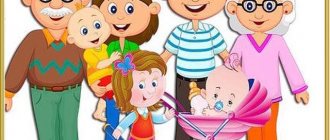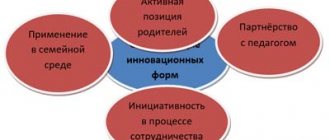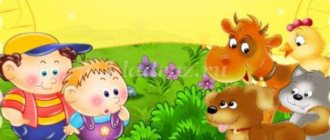Interaction between kindergarten, family and library in child development article (preparatory group)
Interaction between kindergarten, family and library in child development
Today in society, reading ceases to be an absolute value; its loss becomes a huge problem.
The reading experience of many generations testifies that interest in books arises precisely in preschool childhood, because the feelings of a preschooler are particularly emotional. And the earlier an interest in reading appears, the more significant and deeper a reader, a creative personality, a person with a high intellectual level is formed.
In recent years, our country has experienced a crisis in children's reading.
If ten years ago a preschooler always read a book with his parents at night, now books have been replaced by computer games, television and other “benefits” of the 21st century. Parents are increasingly wondering why their children do not read, forgetting first of all that love for a book begins with an example. It is necessary to instill a love for the printed word at a very early age.
By introducing a child to reading, we not only open the way for him to one of the most important sources of information, a book fills a person’s inner world, nourishes his mind and heart, encourages self-awareness, promotes self-realization, and fosters resilience, no matter what situations he finds himself in.
How to preserve the love of reading and pass it on to the younger generation?
The answer is simple! It is necessary to instill a love for books from early childhood, to light this fire in the soul of a child, which will lead him into the vast world of fiction.
Reading with family creates a special atmosphere of mutual understanding, and love and interest in the book is passed on from elders to younger ones. The ability to listen, sympathize, and empathize is formed precisely in moments of collective perception of what has been read, when older family members express their attitude to the events, characters, and language of the work.
Unfortunately, I had to admit that books and family reading do not occupy the first place in children’s lives.
To effectively solve the problem of introducing preschoolers to reading (perceiving) books, in 2015 an agreement was concluded on the interaction of the Children's Educational Institution "Child Development Center - Kindergarten No. 70" with the children's city library located on Kommunisticheskaya Street, 46.
The goal of this interaction is for children to master the basic cultural and moral values of society through joint activities with teachers, parents and children's library workers.
In accordance with the goal, the following tasks were set:
• development in children of cognitive interest in objects and phenomena of the surrounding reality, the formation of a holistic picture of the world;
• developing interest and need for reading (perception) of books;
• development of literary speech, artistic perception and aesthetic taste, broadening the horizons of children;
• formation of value guidelines in children by getting to know the culture and traditions of their native country, preschoolers’ awareness of family and citizenship, and nurturing patriotic feelings;
• increasing the pedagogical competence of parents.
The pupils of our group became acquainted with the library in middle preschool age, when library representatives came to us with interesting, educational presentations and brought books with them, but they began to work closely with the library in 2022, when they moved to senior preschool age
Caring, knowledgeable library workers Irina Alekseevna, Yulia Sergeevna and Elizaveta Mikhailovna interested the children so much that we began to meet with them every month.
In September 2022, we organized excursions to the city children's
library, where children got acquainted with the subscription and reading room, with new products in the world of books, with the professional actions of employees and the rules of conduct in the library. In the reading room, children not only got acquainted with books and their characters, but also read their favorite poems, watched cartoons based on familiar works, and actively participated in quizzes: “For the 300th anniversary of the city of Polevsky”, “Our writer P.P. Bazhov”.
Familiarity with the structure and operation of the library made the children want to create a real library in a group. Many parents supported our initiative and replenished our library in the group with interesting and exciting books that they brought from home. This is how the group library was born. Children began to turn to books more often, look at illustrations, become interested in the plots of works and discuss them. The plot-based role-playing game “Library” arose. The objectives are: to introduce children to library terminology and the rules of behavior in the library; develop an understanding of the significance of books in life; develop independence, communication skills and creativity; ability to analyze and compare; cultivate interest and respect for the book.
Children initiate the game, agree on roles, change them, and constantly develop and enrich the plot. Everyone wants to take on the role of a librarian and give out books to “readers.” It’s hard to say whether this is a game, because everything in it is real: real books, real children - readers, and even real library forms.
Of course, in the process of getting acquainted with books, reading them and looking at them, books break down: pages tear and jump out, covers become damaged. In this case, our group has a “Knizhkina Hospital” that repairs books. Children repair and restore “sick” books in a timely manner, with great desire and care. We note that our students have become much more careful with books, especially those that have been in the “hospital.” We keep a reading diary, where children draw pictures based on the works they read. Children and their parents can take books from our library home to read for a certain time, which is specified in the library form.
Our group participated in the competition “Best Corner of Fiction” and took 1st place among all groups of our preschool educational institution. We received the book “The Great Encyclopedia of Knowledge” as a gift.
Also in the kindergarten there is a mobile library, when library staff once a month bring books to the kindergarten for us to read, and we, in turn, return to the library those that we have already read and reviewed.
In October, our kindergarten held a recitation competition “Poems about Mom”: Yesenia took 3rd place, and Vanya S. took 2nd place.
In November, during the week of the preschool educational institution “Creativity of Children’s Writers,” an exhibition of A. Barto’s books was organized in groups by teachers and parents. The group’s students, together with library staff, created a cartoon based on A. Barto’s poem “The Juggler.”
In December 2022 Pupils of grade 5 “B” from Polytechnic Lyceum No. 21 “Erudite” came to our preschool institution to show us a fairy tale and give us books. We, in turn, made our own bookmarks and gave them to the students.
Three students from our group participated in an intellectual game among preschool institutions in our city and took 2nd team place. For winning we received an encyclopedia about our planet Earth.
For preschoolers, dramatization is extremely interesting - acting out the text in faces. Transformation into an artistic image makes it possible to show how the child understands the text, evaluates the characters, and imagines events. Staging becomes the most important technique in working with a literary text.
Our children actively participate in theatrical activities, love to turn into actors, and actively discuss the scenery and costumes. All conditions have been created for this in the group. For Mother's Day, the guys showed a re-enactment of the fairy tale “How a kitten was looking for its mother” for mothers and grandmothers.
Parents note that their children’s interest in books has increased significantly, which is very important when preparing for school.
Parents are our partners and participants in the educational process. To educate them, in informational parent corners we post consultations and reminders on the topics “What to read to a child?”, “Reading a fairy tale,” “Pure twisters and tongue twisters in the life of a preschooler,” and others.
Parents and children are regular participants in various competitions: Dasha T.’s family participated in the photo competition “My portrait with my favorite book” and took 1st place. The family of Timofey B. participated in the all-Russian quiz dedicated to the work of K.I. Chukovsky. Olya L.'s family took part in an international quiz dedicated to the work of A.L. Barto.
In October, pupils, together with their parents, participated in an exhibition of drawings based on the works of V.G. Suteev, which was located in our preschool educational institution.
In September and December 2022, our students, together with their parents, actively participated in the “Save the Tree” waste paper collection campaign, organized by the staff of our preschool educational institution. Children, parents of other groups and kindergarten staff joined this action. We saved a lot of trees and took 3rd place among all groups, our library was replenished with a new encyclopedia about Dinosaurs for the place we took. Children began to take care of their native nature. After drawing or appliqué, the paper is no longer thrown into the trash, but is put into specially prepared boxes to save more trees.
To summarize, we can talk about the effectiveness of the work done:
— children’s interest in reading and books has increased, children are actively involved in reading activities. Board games “Syllables and Words”, “Fun Alphabet”, “Letters” and others are in great demand among children. Of the 25 children in the group, 7 read fluently, 9 read syllables well and reflect what they read in their drawings;
I would also like to note that children’s speech has become more expressive, clear, and emotional. The practice of “family reading” has strengthened, the authority of the city library has increased, and parents with children have become more active in using its services.
There is every reason to believe that the love of books and reading will remain in children throughout their lives.
By introducing children and adults to reading, we not only open the way for them to one of the most important sources of information, the book fills a person’s inner world, nourishes their mind and heart, encourages self-awareness, promotes self-realization, and fosters resilience.
Kuznetsova E.V. “Preschooler” reader service department of the Belgorod State Children's Library A.A. Likhanov
Today, the problem of literary education of children and introducing them to reading is acute. We are concerned about the displacement of books by sources of information: television, computer games, video products, so the main goal of our interaction is to restore respect for the book and introduce children and parents to reading. It is no secret that the attitude of children towards a book is a mirror reflection of the attitude of adults towards a book, therefore, first of all, adults should become an example of showing interest in a book and understanding its role in a person’s life.
It is no coincidence that in the quotation for my speech I took these very words : “Reading is a habit that is not taught, but is acquired ,” and this habit should appear in a child at a very tender age, and we, the adults who are nearby, can “infect” it with children - parents, teachers, librarians.
In January 2010, the library opened a “Preschooler” section, where little readers are greeted by the kind caterpillar Asya. Until this moment, children were served in the “Childhood” department. The work of the department is carried out under the project “Growing Up with a Book I”, the goal of which is to introduce preschoolers to book culture, the best examples of domestic and foreign literature through reading aloud, discussing what they read, holding literary games and holidays, and moral conversations. While developing the project, we tried to unite the efforts of all categories of adults to fully participate in the life of the child.
Cooperation with city kindergartens is based on an agreement. Preschoolers, together with their teachers, attend classes held in the library once a month.
The project consists of four cycles: “Such different books”, “The semi-precious word”, “Seven-flowered” and “With the warmth of a book under my mother’s wing”, which are aimed at “cultivating” literary “wings” in readers from a very early age.
Classes in the series “Such different books” (for children 4-5 years old) for middle school preschoolers who come to the library once a month help introduce children to different types of unusual books and instill a love for them through play. Also, work on this cycle takes place in a preschool institution, where the pupils are children with disabilities. Every visit of a librarian is a holiday for kids.
To adapt children with special educational needs, children of the same age from speech therapy groups are invited to classes. Together the guys improvise and fantasize. Preschoolers love a series of books: “Transformers”, “Book on a magnet”, “Jump”.
The librarian tries to instill in the child a love of reading through play. It is known that the leading activity of a preschooler is play, so all classes consist of fairy tales, games and creative tasks. We play and read. The kids gradually get used to the arrival of the librarian and look forward to new, interesting books.
The child grows, and various books become more and more part of his life, but the toy book remains with him even at primary school age. The content of the book changes, the nature of the drawings changes, but the type of book itself remains the same. The children grow up, move to the senior group and, together with the teacher, attend classes and various library events.
Classes in the “Gem Word” (for children 6-7 years old) are held in the form of a confidential and friendly conversation, without imposing one or another moral value on children, but helping preschoolers understand that a moral attitude to life is the basis for the development of human society and a happy life . Such meetings consist of games, conversations, reading fairy tales aloud and discussing what they have read. At each lesson, preschoolers get acquainted with new moral concepts: kindness, friendliness, caring, love, mercy.
As a result of such classes, preschoolers become sociable and actively take part in conversations, games, and interpretations. They enjoy performing creative tasks. They take a serious approach to discussing moral issues about good and evil, love, mercy, care, friendship, and give life examples on the topic of the lesson. During the lesson, much attention is paid to reading aloud, which especially helps to understand and evaluate the moral actions of people.
“Seven Flowers” cycle (for children 6-7 years old) help introduce the child into the world of relationships with the surrounding natural world and a careful attitude towards it . The classes are designed for children of senior preschool age; they contain informational, aesthetic and moral characteristics of objects, phenomena, relationships, and give a broad picture of a person’s relationship with the world. The child gets the opportunity to feel, play, think through, realize, i.e. pass through information about the world.
Developmental classes in the series “ With the warmth of a book under mother’s wing ” are attended by preschoolers aged 3-4 years. At this age, the child gets comfortable in the library space, gets used to the fact that a book becomes his faithful assistant and friend: you can go for a walk with it, take it on a trip, it is very pleasant to sleep with it and even swim with it.
During the lesson, the librarian introduces children to toy books with soft inserts imitating the fur of animals or the feathers of parrots, books with surprises, with holograms made in the shape of cars and mounted on plastic wheels... They not only entertain the child, but also help develop fine hand motor skills and tactile sensations. During the lesson, children give free rein to their imagination, guessing what is hidden behind the book’s surprises, and adults actively help them with this.
Not only children, but also their parents take part in literary games in the classroom. Such games provide the joy of family communication and clearly instill a love of reading in a preschool child through demonstration of the reading experience of his relatives. At the end of the lesson, parents note that the children became interested in such unusual books made in bright and pleasant colors, on the pages of which friendly animals smile and ask for help.
Social partnership project between preschool educational institutions and libraries I grow with books
Rationale and relevance of the project In the modern world, the problem of social development of the younger generation is becoming one of the most pressing. Parents and teachers are more concerned than ever about what needs to be done to ensure that a child entering this world becomes confident, happy, and successful. In this complex process of human development, a lot depends on how the child adapts to the world of people, whether he can find his place in life and realize his own potential. Currently, the social well-being of a child largely depends on how he is adapted to the surrounding reality. And this adaptation can be accomplished through social partnership. Social partnership is a civilized form of public relations in the social and labor sphere, ensuring the coordination of the interests of workers, employers (entrepreneurs, local authorities, local self-government by striving for agreement, developing and implementing a common position on socio-economic and political areas. The main thing, we believe We help to form an emotionally positive attitude of children towards the world around them, to motivate them to cooperate with adults and peers. The formation of a person’s spiritual culture is always carried out through reading. In our difficult times, children’s reading needs support more than ever. Instilling in a child a love of reading is seen in this their main goal is teachers of a preschool educational institution and employees of a children's library. Working with preschoolers is a very interesting business, but at the same time, requiring additional knowledge and skills. After all, it is at this tender age that interest in books and reading awakens, and at the same time in Such important concepts as good and evil, honor and conscience, mercy and participation are laid in the child’s consciousness. And kindergarten workers, along with parents and librarians, actively participate in the demanding and multifaceted process of education and personality formation that requires joint efforts. Teachers and library staff have developed a joint work plan and thematic series of events. Hours spent in the library are a good help for parents and children. The goal of the project is to combine the efforts of a preschool educational institution with a children's library for the sociocultural self-realization of participants in the educational process. Project objectives: - create conditions for expanding the creative interaction of preschool educational institutions with the children's library to create a unified socio-cultural system; — create conditions for the creation of an educational system of a preschool educational institution with a children's library for the development of creative potential and cognitive activity of participants in the educational process; — create conditions for improving the form of interaction with institutions of additional education to expand the social and educational system of preschool educational institutions; — create conditions for the development of the spiritual and moral culture of participants in the educational process. Stages of implementation: Interaction with social partners may have a variable nature of building relationships in terms of the time of cooperation and the formalization of agreements (plans) for joint cooperation. The development of a social interaction project is built in stages. Each stage has its own goals and solves specific problems. Stage 1 – preparatory. Its goal is to determine the goals and forms of interaction with objects of society. Objectives of this stage: • analysis of social objects to determine the feasibility of establishing a social partnership; • establishing contacts with organizations; • determination of areas of interaction, deadlines, goals and specific forms of interaction. Stage 2 – practical. Its goal is to implement cooperation with organizations and institutions of society. Tasks of this stage: • drawing up an agreement on creative cooperation between the preschool educational institution and the children's library. • drawing up a plan of joint events for the academic year; • conducting excursions for preschool children to the children's library; • attendance by preschool pupils of events, “open days” held in the children's library. Stage 3 – final. Its purpose is to sum up the results of social partnership. The tasks of this stage: • analysis of the work done; • determination of effectiveness, feasibility, prospects for further cooperation with social organizations. Implementation period – 1 calendar year. Event plan No. Name of the event Calendar dates The book leads us to knowledge 1. “Visiting the brownie Kuzi” (excursion to the library) January 2. “In the country of Reading” (for Reader’s birthday) February 1 3. “Birthday “Murzilki” May 16 Fairytale calendar 4. “Day of the Frog Traveler” February 14 5. “Many interesting fairy tales have accumulated over the centuries...” (educational and game program for World Fairy Tales Day) June 7 6. “It was baked from flour, it was cold in the window" (Kolobok Day in the library) August 16 Games, toys, entertainment 7. "Day of the Jump Rope" (Educational and gaming program) August 4 8. "Book and Toy Day" October 24 9. "Oh, you little matryoshka doll ! » November Family and home 10. Holiday “Family is seven people just like me” (for International Family Day) May 15 11. “My best friend is my mom” March 12. “Dad can do anything” (educational) game program) June From epics and fairy tales 13. “Brownie, brownie, play and give it back” April 1 14. “Baba Yaga birthday girl” (cognitive and game program) June 26 15. “From epics to counting rhymes” Dedicated to those with a sweet tooth 16. “The Cure for Boredom” (chocolate and ice cream festival) July



